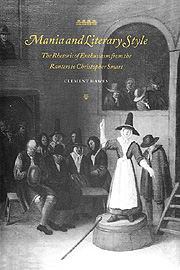Book contents
- Frontmatter
- Contents
- Acknowledgments
- Introduction: Mania as rhetoric
- PART I DEFIANT VOICE
- 1 “Howle, you great ones”: enthusiastic subjectivity as class rhetoric
- 2 “A huge loud voice”: levelling and the gendered body politic
- 3 Strange acts and prophetic pranks: apocalypse as process in Abiezer Coppe
- PART II PATRICIAN DIAGNOSIS
- PART III CHALLENGING LIMINALITY
- Epilogue: Beyond pathology
- Index
- CAMBRIDGE STUDIES IN EIGHTEENTH-CENTURY ENGLISH LITERATURE AND THOUGHT
2 - “A huge loud voice”: levelling and the gendered body politic
Published online by Cambridge University Press: 16 September 2009
- Frontmatter
- Contents
- Acknowledgments
- Introduction: Mania as rhetoric
- PART I DEFIANT VOICE
- 1 “Howle, you great ones”: enthusiastic subjectivity as class rhetoric
- 2 “A huge loud voice”: levelling and the gendered body politic
- 3 Strange acts and prophetic pranks: apocalypse as process in Abiezer Coppe
- PART II PATRICIAN DIAGNOSIS
- PART III CHALLENGING LIMINALITY
- Epilogue: Beyond pathology
- Index
- CAMBRIDGE STUDIES IN EIGHTEENTH-CENTURY ENGLISH LITERATURE AND THOUGHT
Summary
and day and night with a huge loud voice proclaiming the day of the Lord throughout London and Southwark.
Abiezer Coppe, A Second Fiery Flying RouleThe rhetorical project of the manic mode is best defined as a politics, far-reaching but ultimately uneven, of levelling. This levelling agenda explains not only the enthusiastic propensity for catalogues and for the use of certain topoi from Biblical prophets, but also more blatantly “irrational” rhetorical features. These latter features include the disjunctiveness of enthusiastic rhetoric – its “stammering tongue,” its deliberately fractured evocations of the ineffable – as well as its peculiarly serious playfulness with language. A certain rhetoric of bodily desire, moreover, drawing on the Song of Songs, serves as a favorite medium for a “levelling” of the mind/body hierarchy. What gives a certain unity to this constellation of rhetorical effects is a consistent collective project in which the levelling “materiality” of paralogical language figures the body.
We must not forget, however, that the body itself is a politically contested figure. For my point is precisely not to reproduce the conservative bromide that enthusiasm is merely displaced eroticism. As James Grantham Turner points out, “the secular diagnosis of ‘Enthusiasm’ as a genital disorder…was already strong at the time of the English Revolution.”
- Type
- Chapter
- Information
- Mania and Literary StyleThe Rhetoric of Enthusiasm from the Ranters to Christopher Smart, pp. 50 - 76Publisher: Cambridge University PressPrint publication year: 1996

